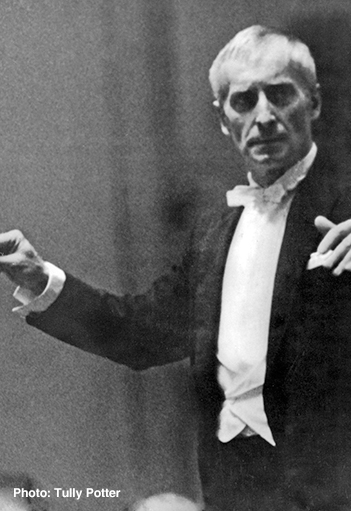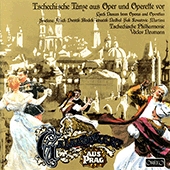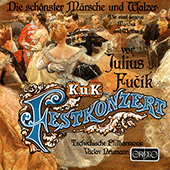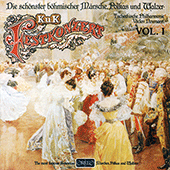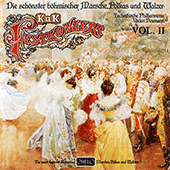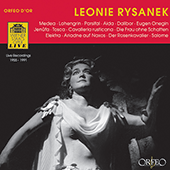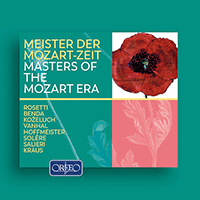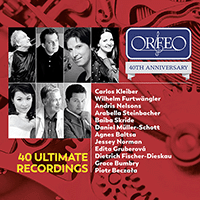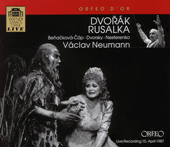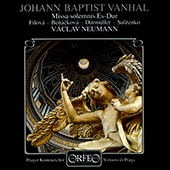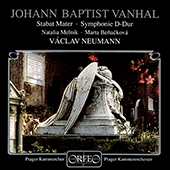Václav Neumann
Václav Neumann’s family was musical: he learnt the violin as a boy, and played chamber music while at school. Although he was a student of history, musicology and Czech philology, because the Czechoslovakian universities were closed during World War II, he entered the Prague Conservatory, where he studied the violin with Josef Micka and conducting with Pavel Dědeček and Metod Dolezil. In 1941 Neumann became a founder member, with Antonín Kohout, of the chamber music group which later became known as the Smetana Quartet: initially he was its first violin, and later took over the viola position. The quartet began to give concerts from 1945, the year in which Neumann also joined the Czech Philharmonic Orchestra; however when the orchestra’s chief conductor, Rafael Kubelík, fell ill in 1948, Neumann substituted for him with success, and his career as a conductor was launched.
Having worked regularly with the Karlovy Vary State Philharmonic Orchestra, in 1951 Neumann was appointed its chief conductor, moving after three years to Brno where he held a similar position with the Brno State Philharmonic Orchestra. During this period he met the director of the Berlin Komische Oper, the distinguished stage director Walter Felsenstein, who invited him to conduct Janáček’s opera The Cunning Little Vixen for his company in Berlin. Neumann fulfilled this engagement during May 1956, in a production which enjoyed enormous success: it received many performances in Berlin and also toured to Paris. Neumann went on to conduct regularly at the Komische Oper between 1956 and 1964, and served as its chief conductor for two seasons. During the same period he was also active as the chief conductor of the Prague Symphony Orchestra.
Following this same pattern, between 1964 and 1968 Neumann held simultaneously the posts of chief conductor of the Leipzig Gewandhaus Orchestra and Leipzig Opera and that of second conductor of the Czech Philharmonic Orchestra; and when that orchestra’s then chief conductor, Karel Ančerl, decided while conducting in North America in 1968 not to return to Czechoslovakia, following the Russian occupation of his homeland, Neumann took over as the Czech Philharmonic’s chief conductor, remaining in this post until 1990, and returning briefly to it between 1992 and 1993. He toured extensively with the orchestra and together they made many recordings for the Czech label Supraphon. Neumann also returned to the world of opera for a short while, as chief conductor of the Stuttgart Opera from 1970 to 1973 in succession to Ferdinand Leitner.
A highly musical and undemonstrative conductor, Neumann was able to achieve excellent results from the musical organisations with which he worked. On the podium his beat was clear, simple, and rather wide. He was an extremely effective conductor of opera, with a keen sense of the dramatic; and he brought to his symphonic performances the clear grasp of structure as well as atmosphere which was characteristic of his operatic readings. The transfer to private ownership of the former state record company Supraphon has seen many of Neumann’s recordings disappear from the catalogue; but central to his large discography are his complete recordings of the symphonies of Dvořák, Mahler and Martinů. Both the Dvořák and Martinů are highly idiomatic and superbly played by the Czech Philharmonic; and if Neumann’s Mahler cycle does not consistently achieve the heights reached by the foremost interpreters of this composer’s music, it is nonetheless very distinguished, with refined orchestral playing, extremely sympathetic interpretations, and spacious recorded sound. Also of note are his performances of the music of Smetana, especially My Country; and of Suk, for instance the latter’s massive Asrael Symphony. Neumann’s relatively few operatic recordings are of a similarly high standard, and include excellent accounts of Dvořák’s Rusalka, Janáček’s From the House of the Dead, The Cunning Little Vixen and The Excursions of Mr Brouček, Martinů’s rarely heard Ariadne, and Smetana’s The Secret. Neumann, like other contemporaneous Czech conductors such as Zdenĕk Košler, possessed an instinctive feeling for French music: his early recordings of Roussel’s Symphony No. 3 and the Suite No. 2 from his ballet Bacchus et Ariane with the Brno State Philharmonic Orchestra made a fine pairing. A keen proponent of Czech music, Neumann recorded many works by contemporary Czech composers; his accounts of Petr Eben’s Vox Clamantis, Victor Kalabis’s Symphonic Variations and Vladimir Sommer’s Choral Symphony are especially notable.
© Naxos Rights International Ltd. — David Patmore (A–Z of Conductors, Naxos 8.558087–90).







